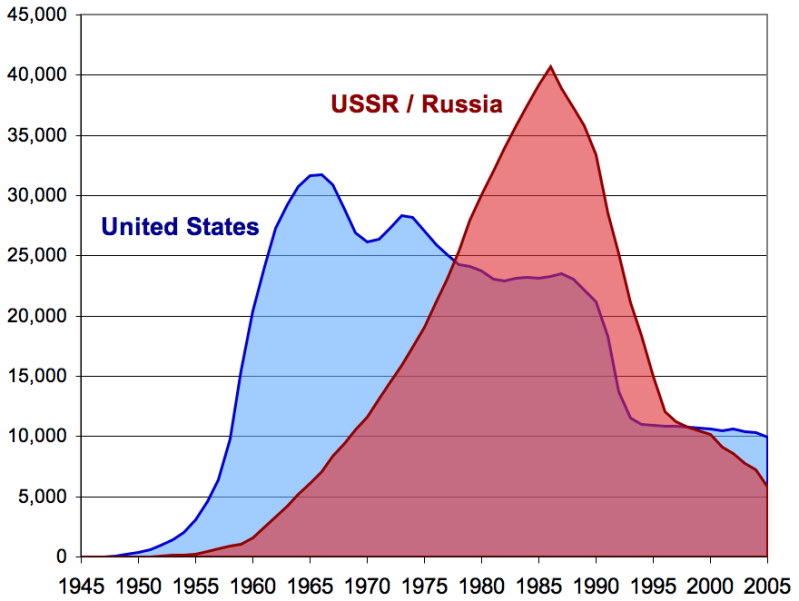Lord of the Abyss wrote:General Schatten wrote:Lord of the Abyss wrote:Actually, the usual "worst case scenario" presented by its critics is that it negates MAD, convinces the leadership of the defended country that they can win a nuclear war and causes the loss of millions of lives.
Except it doesn't at least not for America and Europe: Before the Cuban Missile Crisis NATO had overwhelming nuclear superiority to make a first strike option a viable method of winning the Cold War then and there, the European NATO powers would've gotten a pretty serious bloody nose and America would've take a handful of ICBM but the USSR would most certainly have lost.
So what? You talk as if "a handful of ICBMs" would be something other than a massive disaster. And I'm sure the Europeans would have loved being America's human sacrifice. And that's all assuming you are right.
Damage from "a handful of ICBMs" would have been... I would think on par with or less bad than the damage the USSR took in World War Two, in relative terms.
Honestly, I suspect the whole "gives us delusions of invulnerability and causes us to strike first for stupid reasons" concept is a red herring: unless you have a
really truly ironclad defense, good enough that the outcome of the war is really, really lopsided, you won't strike first. Even then you won't do it lightly, because the resulting economic disruption and indirect effects on your allies are still going to be one hell of a lot worse than just
not fighting the war.
I think that's Schatten's point. Even knowing in 1958 or whatever that the US had a window in which it could (apparently) break through Soviet air defense and devastate the USSR while taking only 'moderate' damage (as in, damage that can be recovered from in a decade or two of rebuilding)...
why? What would be the incentive to do such a thing?
Also, this theory ignores the question of what happens in the event of an accidental war. There is a nonzero chance of a simple mistake causing nuclear war: unnecessary provocations, random events being mistaken for a missile launch, and so on. Such accidents are far more destabilizing when both sides know that they are doomed the moment the first missile flies because of inevitable retaliatory strikes.
The pressure to launch first and make sure the enemy is
really really flattened, as opposed to being merely badly damaged, should not be underestimated. And yet both sides will feel this pressure once they come to believe that nuclear war is truly inevitable. If I see a missile flying my way, I have to make the decision to launch very quickly, with minimal time to reconsider. Otherwise I risk letting an enemy MIRV get a free shot at some territory within my country (my own missiles, my cities) before my retaliatory strike can do anything to thin out their strike capability.
Unless, of course, I can simply shoot that missile down.
Another point to consider is that MAD by itself, while
theoretically stable, leaves much to be desired as a political stance. It is perverse for a government to turn to its people and say "no, we have no plans for what to do after the missiles fly, and no way to protect any of you; we are basing all our hopes on the assumption that because neither we nor our enemy can protect anyone, we will both be extra-careful to avoid anything that might result in everyone dying."
That does not strike me as a reassuring position. It is even less reassuring to allies of a state engaged in MAD. If I'm a non-nuclear state allied to nuclear state A for fear of nuclear state B (be that state Russia or Iran), I do NOT want to hear "we have no way to protect you, but we can engage in mutual annihilation with B if we want after you're dead."
Among other things, there's no way in hell I can count on A to agree to mutual suicide with B
after my country has already been taken over. MAD is not a security guarantee for third parties; the offer to deploy ABM systems can be.


